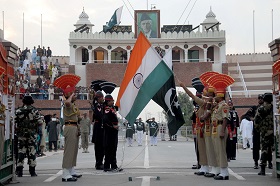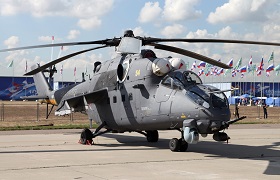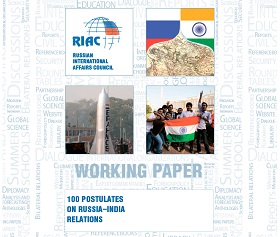Despite India’s protests, Russia will participate in the first joint Russia–Pakistan military exercise in close proximity to the disputed Kashmir, where the confrontation between New Delhi and Islamabad has again escalated into armed confrontation in recent weeks. How do New Delhi and Islamabad perceive Moscow’s actions? Does a rapprochement between Russia and Pakistan threaten the time-tested Moscow–New Delhi partnership?
Despite India’s protests, Russia will participate in the first joint Russia–Pakistan military exercise in close proximity to the disputed Kashmir, where the confrontation between New Delhi and Islamabad has again escalated into armed confrontation in recent weeks. How do New Delhi and Islamabad perceive Moscow’s actions? Does a rapprochement between Russia and Pakistan threaten the time-tested Moscow–New Delhi partnership?
On September 23, a Russian military contingent arrived in the city of Rawalpindi, the holy of holies of Pakistan’s military command. Fortunately, this is not another anti-terrorist operation conducted by the Russian military abroad; rather, it is Russia simply getting ready for Friendship-2016, a joint Russia–Pakistan military exercise that will be held until October 10. The exercise can hardly be called large-scale: only 70 troops from the Southern Military District arrived in Pakistan. It is possible that this piece of news would have been lost in the flood of information coming from various news agencies, especially given the Russia–India joint military exercise Indra–2016 conducted in Primorsky Krai on a far larger scale, had it not been for several factors which nearly provoked a diplomatic scandal between Moscow and New Delhi.
Firstly, this is the first military exercise conducted jointly by countries that had been previously on the opposite sides of the Cold War. Just a few years ago, the Russian military presence in Rawalpindi (which is essentially Pakistan’s Pentagon) would have been impossible to imagine; suffice it to say that Rawalpindi had once served as the coordinating centre for the forces fighting against the Soviet military in Afghanistan. Secondly, the uproar surrounding the news was whipped up by the information that the exercise may be held in the Pakistan-controlled part of Kashmir, where the interests of India, Pakistan and China collide. It is hardly surprising that political analysts attempt to see this news proof of an emerging thaw in Russia–Pakistan relations, while at the same time searching for signs of growing problems in the Russia–India strategic partnership, although few had doubted its strength before. What could the Russia–Pakistan “Friendship” mean for the future development of Russia–India relations?
In Near-Combat conditions
The military exercise did not come as a surprise; news that it was going to take place spread back in the early 2016. Yet its timing coincided with another escalation in India–Pakistan relations. On September 18, an Indian military garrison was attacked in the town of Uri, located in Jammu and Kashmir near the Line of Control. The attack proved to be the deadliest of the last two decades, claiming the lives of 19 Indian soldiers. The Prime Minister of India said that the attack had been orchestrated by Islamabad and that India would make every effort to isolate Pakistan in the world as a country that finances terrorists. New Delhi requested that Russia abandon its plans to hold a joint military exercise with Pakistan, but Moscow rejected the request, which Pakistani media depicted as a failure of attempts to isolate Islamabad.
The situation continued to escalate as the Russian and Pakistani media learned that the drill would be held in two locations: the Cherat base in the province of Khyber Pakhtunkhwa on the border with Afghanistan and the Army High Altitude School in Rattu in the province of Gilgit-Baltistan, which is part of the Pakistan-controlled part of Kashmir called Azad Kashmir (“Free Kashmir”). New Delhi reacted to the prospect of a military exercise in a territory that India considers to be illegally occupied by Islamabad in an entirely predictable manner. Vikas Swarup, the spokesperson of the Ministry of External Affairs of India, stated that Gilgit–Baltistan is part of India’s territory and India’s “well-known sensitivities” on the issue of territorial rights to Kashmir were conveyed to Russia. Even such evidently harmless rhetoric sounded particularly harsh given the harmony and mutual understanding that have traditionally prevailed in Russia–India relations. The Russian Embassy in New Delhi was forced to reassure its Indian partners that the Russian military would only participate in the exercise in Cherat and the exercise would not be held on the disputed territory.
Russia in the Kashmir Conflict
What provoked such a heated reaction from New Delhi? This is an anti-terrorist drill, and the tiny Russian contingent could not possibly pose any threat to India’s positions in Kashmir. India is most certainly not worried about Russia as a military threat; what India is worried about is a series of precedents that would allow Pakistan to interpret the issue of Kashmir’s legal status to Pakistan’s benefit.
Deploying a military contingent on the territory that New Delhi views as an integral part of India without India’s approval could be considered a violation of India’s sovereignty and territorial integrity. From Pakistan’s perspective, this could be viewed as a de facto recognition by Russia of Islamabad’s sovereignty over the part of Kashmir to the north of the Line of Control.
Russia’s military participation in the drill in Azad Kashmir could appear particularly unfriendly to India, given its position regarding the status of Crimea. In essence, New Delhi took Russia’s side in the conflict when it acknowledged Russia's “legitimate interests in Ukraine” and semi-officially received Sergei Aksyonov, the Prime Minister of the Republic of Crimea, in India when he accompanied President Putin during his visit to India in December 2014.
India has traditionally opposed any interference by third parties in Kashmir-related issues, as it believes that the issue of the rights to Kashmir can only be solved between New Delhi and Islamabad as a matter of their bilateral relations. Pakistan, on the contrary, strives to turn the peaceful settlement into an international issue, as it regularly puts the issue on the UN agenda and seeks support from other states.
Issuing visas and official permits is a typical South Asian way of “staking a claim” to disputed territories. Islamabad already used such diplomatic tricks in Kashmir when, prior to 1984, it issued official permits to foreign geological expedition and mountain climbers to visit the Siachen Glacier located on the Line of Control in Kashmir. The territorial rights to the glacier had not been clearly defined until the issue escalated into an open armed conflict between the Indian and Pakistani militaries. In 1959, Pakistan also gave China permission to build the Karakoram Highway in Azad Kashmir, and in 1963, it “ceded” some of its territory in Indian Kashmir to China, having thus legalized the presence of the Chinese military in Kashmir after the Sino–Indian border dispute.
Despite close strategic ties with India going back to Soviet times, Moscow has traditionally taken a neutral stance on the issue of peaceful settlement in Kashmir. The actual participation of the USSR, and then Russia, in the peace making process was limited to “good offices” in establishing a dialogue – that is, to providing a platform for negotiations, first in Tashkent after the second India–Pakistan War of 1965, and then during the India–Pakistan armed confrontation in 2001–2002. Moscow should not underestimate the consequences that might stem either from the actual presence of the Russian military on the disputed territory, or from the mere fact that an official discussion of the possibility of such a presence with Pakistan has taken place. It could nix Russia’s policy of neutrality and seriously damage Russia–India relations.
An Old Friend is better than Two New Ones
Most likely, the exercise will not be held in Kashmir, but that will hardly alleviate New Delhi’s concerns, since this drill will not be the first sign of an emerging rapprochement between Russia and Pakistan. Russia lost several major tenders for selling military equipment to India, and in 2015, it concluded a contract with Pakistan on the sale of four Mi-35M attack helicopters, the first arms deal to be made between two countries that had been on the opposite sides during the Cold War. According to unofficial information, the contract may be expanded to 12 helicopters. Islamabad is also interested in purchasing Russian Su-35 multirole fighters, small-arms weapons systems and hand-held grenade launchers. In addition to military-technical cooperation, Russia intends to participate in a large-scale infrastructure project in Pakistan – namely, the construction of the North-South gas pipeline, which will require $2 billion dollars of Russian investments.
The intensification of Russia–Pakistan bilateral cooperation in 2015 gave rise to the opinion that the emerging a rapprochement between the two countries at this particular moment is not accidental and is a demonstrative step on the part of Russia in response to India actively developing ties with western countries under the leadership of its Prime Minister Narendra Modi. Even if these guesses are indeed correct, it is unlikely that Russia will seriously consider the possibility of changing its strategic partner in South Asia: the scale of Russia’s cooperation with India is significantly greater than with Pakistan. India is still the leading importer of Russian arms, and in the near future, it will become the largest foreign customer of the Russian nuclear sector; India is interested in purchasing liquefied natural gas from Russia, and given the western sanctions, India may become a large investor in the Russian energy sector. India’s role on the international arena is far greater than that of Pakistan; it has successfully played up its image of “the world’s largest democracy,” while just a couple years ago Pakistan could be easily classified as a failed state.
To preserve its relationship with India, Moscow has to weigh its steps in its relations with Pakistan very carefully, especially in those areas that could touch upon India’s national interests. The actions of the United States, another extra-regional power, could serve as a warning for Moscow. In 2011, the United States took out Osama Bin Laden in Abbottabad without running the operation by Pakistan first. Even though the two countries had the common goal of fighting terrorism, Islamabad considered this step to be an egregious violation of Pakistan’s sovereignty, and it cost Washington its principal strategic partner in the region.








